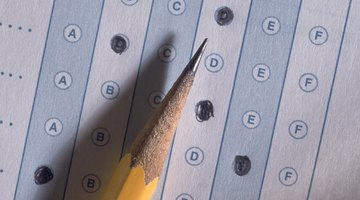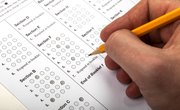Beginning in elementary school and continuing through high school, students are exposed to a multitude of standardized tests. Cognitive skills are the basic processes used in learning, such as logic and reasoning. Testing these skills measures a student’s ability to learn, predicting her potential academic success. Achievement tests focus on specific classroom subjects. Both of these testing formats provide teachers, parents and students with insight into a student's progress and highlight areas for improvement.
Cognitive Testing Basics
Cognition refers to a group of mental processes, including memory, problem solving, decision-making, learning and attention. Unlike academic skills, cognitive skills cannot be taught. You can only strengthen your brain’s ability to process, analyze and retain information. Common cognitive tests include the Stanford Binet Scale, commonly thought of as a standard IQ test, the Otis-Lennon School Ability Test and the Cognitive Abilities Test.
Achievement Testing Basics
An achievement test measures a student’s knowledge and academic skills in a standardized way, typically through multiple-choice questions. Most achievement tests focus on specific subjects, such as science, math, social studies and English. Common achievement tests include Iowa Tests of Basic Skills, Stanford Achievement Tests and Metropolitan Achievement Tests.
Assisting With Learning Disabilities
Unlike achievement tests, cognitive tests can highlight learning problems and provide possible solutions. Instead of measuring a student’s academic skill, cognitive tests identify and pinpoint specific strengths and weaknesses. By examining a range of underlying cognitive skills, these tests can determine specific learning difficulties. This helps parents, teachers and students understand why a difficulty exists and provides answers for how to overcome it.
Broader Assessments
Achievement tests are used for more than measuring a student’s learning ability. They provide insight into teacher effectiveness, quality of a school’s academic program and information on classroom progress. This information can be used for future class groupings and placement, school funding and teacher assessments.
Considerations
While both cognitive and achievement tests measure aspects of student performance, they do not test all indicators of knowledge and skill. These tests do not measure motivation, creativity or cooperation, all important aspects of academic performance. Most school systems also use observations, performance exams and classroom participation to establish a broader assessment of students.
Related Articles
References
Writer Bio
Fitzalan Gorman has more than 10 years of academic and commercial experience in research and writing. She has written speeches and text for CEOs, company presidents and leaders of major nonprofit organizations. Gorman has published for professional cycling teams and various health and fitness websites. She has a Master of Arts from Virginia Tech in political science and is a NASM certified personal trainer.











